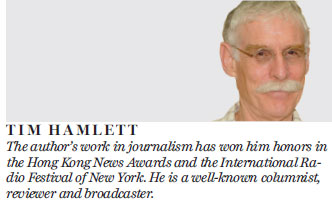No easy answers to the retirement questions
Updated: 2015-01-16 05:31
By Tim Hamlett(HK Edition)
|
|||||||||
The problem with provision for retirement is quite simple.
On average a person who retires needs to cater for about 20 years in which he or she will need to eat and will not wish to work.
The problem is that this is an average figure. Someone who is heavily engaged in drinking, smoking and fast women is probably not going to need provision for 20 years. Men with unhealthy lifestyles and demanding jobs frequently die soon after leaving the desk. The healthy and lucky, on the other hand, may actually manage to hang around for another 40 years.
This has two consequences: Even if we all carefully save enough to cover the expected 20 years, half of us will be lucky, or unlucky, enough to be here when the money runs out; and a substantial majority will find, when the last journey looms, that they have saved far more than they needed.

There are other possible problems, involving inflation, temptation, and expensive surprises, but let us stick with the basic premise. Where people's requirements are as varied and unpredictable as this the obvious solution is a pool. We all pay in, and those who need one year's money and those who need 40 years take what they need. Everyone is then better off. This is elementary. Clearly the easiest solution in most cases will be for the government to run the pool, which is already collecting money and distributing it for other purposes.
This apparently obvious solution is subject to certain practical difficulties. If the government collects the money there will be a temptation to change the nature of the scheme. Instead of saving the cash for paying out later, the government will be tempted to use it for other purposes and pay pensions as they become due from the general pot. And indeed, politicians being what they are, this is the solution generally adopted. Hong Kong is now at the stage in the territory's affairs where everyone agrees that something should be done about this. The MPF is a manifest and rampant failure, and is in any case open to the fundamental objection that it does not cater at all for the predictably large variation in life-spans.
Chief Executive Leung Chun-ying announced in his third Policy Address that HK$50 billion would be earmarked for "retirement protection", and a consultation would be held later on how this protection should be implemented.
Somewhat optimistically, Leung looked forward to "rational and pragmatic discussions with a view to arriving at a community consensus".
Unfortunately this is a recipe for continuing inaction. Pension schemes commonly involve the collection of a contribution from the working population, even if that is in practice used to discharge current obligations instead of being saved to cover future ones. It is also customary to require a contribution from employers.
Hong Kong's public finances could in theory allow it to dispense with these features, but in view of our government's fear of deficits that is not going to happen.
Employers will inevitably voice their vigorous opposition to any sort of proper pension scheme, with universal liability to pay and universal rights to receive.
Of course, they will not put it quite like that.
The message will be that universal pension schemes are what ruined the finances of European countries, that any scheme will be a financial millstone because people are living longer, and that such plans are a socialistic blemish on Hong Kong's tradition of small government, likely to see us demoted in meaningless rankings produced by distant free-market ideologues.
The European point is nonsense. Greece has a pension scheme. However so does Denmark, widely regarded as providing the peak of happiness to which all developed countries should aspire. The demographic problem is genuine, but not insoluble. Most people, given the chance, show a preference for later retirement these days. The tradition of small government should not be an excuse for offering Victorian standards of social welfare.
A more interesting objection is that a universal pension can be claimed by paupers and millionaires alike. Some of the money will go to people who do not need it. The obvious answer to this objection is that because of Hong Kong's growing wealth gap the millionaires are increasingly outnumbered by the needy. And after all they do pay taxes.
Connoisseurs of social welfare reform will also note that means-tested benefits are cheaper not only because they exclude the rich, but because they exclude large numbers of other people who are too shy, too proud or too disorganized to make a claim, even though they do need the financial support.
(HK Edition 01/16/2015 page1)